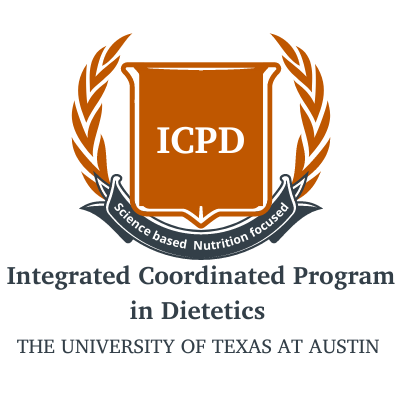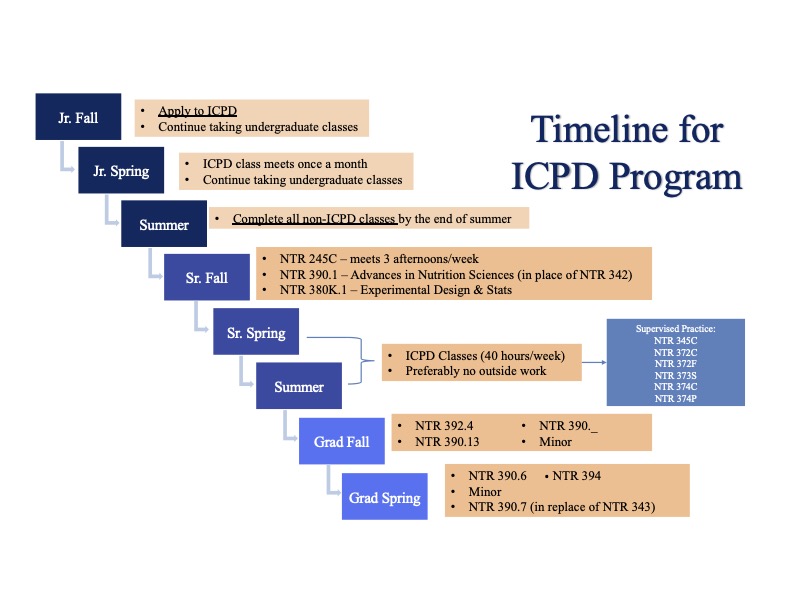
Announcements
Applications are now OPEN (link below under Step 1)
Here is the slection calendar for the 2024 Application Process:
Date
|
Activity
|
Monday, 7/1/24
|
Application Open
|
Monday, 8/26/24
|
1st day of class
|
Sunday, 9/15/24 @ 11:59pm
|
Application Deadline
|
Friday, 9/20/24
|
Round 1 Notifications
|
Sunday, 10/6/24
|
Video and Letters of Recommendation Deadline
|
Monday, 11/4/24
|
Decision Letters
|
11/4/24 - 11/15/24
|
Spring Registration
|
Welcome, Prospective Students,
As you begin the application process for the Integrated Coordinated Program in Dietetics, you might find that you have questions. The two most commonly asked questions:
*You must be an enrolled student at the University of Texas at Austin to apply for the ICPD program.
*ICPD provides a bachelor's degree + master's degree + supervised practice. You must complete all three components as an ICPD student.
Should you not find the answers here, please contact Monica Milonovich, Director of the Integrated Coordinated Program in Dietetics.
ICPD Application
Applications to the Integrated Coordinated Program in Dietetics are accepted during the fall semester (typically the semester you are taking NTR 371). Admitted students will begin taking ICPD classes the following Fall of 2025 and will complete the program in Spring of 2027.
ICPD Application Directions
The ICPD application process consists of two rounds. You will not need to complete Round 2 until invited to do so.
Round 1--Application
Step 1:
Click HERE to access the application.

Please note before you start the application:
-
If you are inactive in the application for greater than one month, the application information will clear out and you will be required to start over.
-
Once you submit a file while in the application, you cannot change the file or submit another file.
Step 2:
Materials you will need for your application:
- Resume
- Personal Statement
- Communicate your understanding of the field of dietetics, the role of a registered dietitian, and how you are prepared.
- Articulate your critical thinking skills and ability to ask good scientifc/research questions.
- Address how nutrition research can impact our field and your future practice as a registered dietitian.
- Interactive Degree Audit
- Official transcript(s)
Step 3:
Submit your official transcripts to Monica Milonovich, ICPD Program Director.
Round 2--You will receive further details when invited to proceed in the process
-
Letters of Recommendation
-
INterview Video
Students just be currently enrolled at the University of Texas at Austin to apply for ICPD.
ICPD Prerequisites
Students who apply to the Integrated Coordinated Program in Dietetics must be able to have completed the following courses by the end of the spring semester before they would start ICPD Supervised Practice/Graduate Courses.
- CH 301, 302, 204, 320M and BCH 369
- BIO 311C, BIO 325, and BIO/INB 365S
- NTR 307/107L Introductory Food Science / Laboratory
- NTR 312 Introduction to Nutritional Sciences
- NTR 315 Nutrition through the Life Cycle
- NTR 317L Inroduction to Nutrition Assessment and Education
- NTR 326 Intermediate Nutrition & Metabolism
- NTR 126L Nutritional Sciences Laboratory
- NTR 334 Foodservice Systems ManagementNTR 234L Foodservice Management Laboratory
- NTR 330L Advanced Nutrition Assessment and Counseling
- NTR 332 Community Nutrition
- NTR 338W Issues in Nutrition and Health
- MAN 320F Foundations of Mgmt & Organizational Behavior
- NTR 370 Medical Nutrition Therapy I (spring-only)
- NTR 371 Medical Nutrition Therapy II (fall-only; NTR 371 can be taken before 370)
All non-ICPD coursework must be completed before the start of the ICPD program.
ICPD Courses
Fall Semester
NTR 245C Clinical Practice in Medical Nutrition Therapy I
Orientation to dietetic practice; techniques of communication, data collection and evaluation. Nine hours of supervised practice per week. Each week students will be assigned to assess, plan and provide care for hospital patients with a variety of different nutritional problems. Students will gain experience with patient interaction and advanced assessment such as enteral or parenteral nutrition.
NTR 390.1 Advances in Nutrition Science*
Carbohydrates, fats and proteins: functions, sources, and metabolism graduate level course.
NTR 380K.1 Experimental Design and Statistics*
Graduate course explores applications of statistical analysis methods for nutrition-based data and analysis of data sets and interpretation of results.
*Students must achieve a B or better in the graduate courses to continue to supervised practice. If student does not achieve a B or better in both courses, they will become DPD students.
Spring Semester-Supervised Practice
NTR 345M Clinical Practice in Medical Nutrition Therapy II
Application of principles of medical nutrition therapy to the care of patients in health care facilities. Forty hours of supervised practice a week for 4 weeks.
NTR 372C Practicum in Clinical Dietetics
Supervised practice in health care facilities. Forty hours of supervised practice per week for 4 weeks. During these eight weeks students will work under the direct supervision of clinical dietitians in area hospitals. The experience will culminate with students assuming responsibility for all nutrition care for the patients on an assigned hospital unit.
NTR 372F Practicum in Foodservice Systems Management
NTR 372F Practicum in Foodservice Systems Management Supervised practice in food service facilities. Forty hours of supervised practice per week for 4 weeks. Students will learn all aspects of managing a foodservice operation. By the end of the rotation, students will assume the manager’s role in the operation.
NTR 373S Practicum in Dietetic Administration
NTR 373S Practicum in Dietetic Administration Supervised practice in administration of food and nutrition programs. Forty hours of supervised practice per week for 4 weeks. Students will be assigned to work on a project under the supervision of an administrative dietitian.
Summer Semester-Supervised Practice
NTR 374C Practicum in Community Dietetics
Supervised practice in community based nutrition programs. Forty hours of supervised practice per week for 5 weeks. Students will practice in a variety of public health and community nutrition settings.
NTR 374P Advanced Practicum in Dietetics
Culminating experience in the practice of administrative, clinical or community dietetics. Forty hours of supervised practice a week for 5 weeks. Students will gain additional experience in a variety of nutrition related rotations.
Graduate Courses
Example plan of graduate courses. Students have the option of taking 6 credit hours outside of Department of Nutritional Sciences to satisfy graduate degree requirement.
| Fall Semester |
Spring Semester |
-
NTR 392 13 Nutrtion and Disease Prevention
-
NTR 394 Current Issues in Nutrition
-
NTR 392 Evidence Synthesis and Communication
-
Elective
|
-
NTR 390.6 Molecular Nutritional Sciences
-
NTR 392.4 Immunology
-
NTR 390.7 Advances in Nutrition Sciences II
-
elective
|
Informational Materials:
1. Mission Statement Integrated Coordinated Program in Dietetics
Mission of the Integrated Coordinated Program
The Mission of the Integrated Coordinated Program in Dietetics is to qualify graduates for entry-level positions, graduate study and advancement to positions of leadership in clinical, administrative or community dietetics. Balanced preparation in the primary areas of dietetics that is built on a strong foundation of academic preparation recognizes the need for practitioners with clinical, foodservice management and community skills in the vast non-urban expanse of Texas.
Goals of the Coordinated Program
- Prepare students for successful entry into the dietetics profession.
- Provide credentialed dietitians for the state of Texas.
- Prepare professionals capable of advancement in their chosen area of dietetics practice and encourage graduates to become leaders in the dietetics profession.
Students who have recieved a BS or BSA in Nutrition from the University of Texas at Austin are ineligible to apply for the Integrated Coordinated Program in Dietetics.
Estimated Cost of the Integrated Coordinated Program in Dietetics in addition to routine tuition and fees during the program:
|
Estimated Expenses
|
Cost |
|
Professional Liability Insurance
|
$17 |
| Drug Screening |
$39
|
|
Compliance Tracking
|
$35 |
|
Background Check
|
$39 |
|
Student Program Management Fee
|
$90 |
| Health Insurance, (available through student health service) |
~$1,110
|
|
Student membership in the Dietitians of Central Texas (DCT)
|
$25 |
|
TB testing
|
$20 |
|
Criminal Background Check
|
$39 |
|
Student membership in the Academy of Nutrition and Dietetics
|
$50 |
|
Food Handler Certification
|
~$10 |
|
Transportation to supervised practice sites (gas)
|
Varies |
| Required attendance at professional meetings |
Varies
|
|
Scrubs/Uniforms/Lab Coat
|
Varies
|
| Academy of Nutrition and Dietetics Pocket Guide to Nutrition Assessment |
Eat Right Store |
| Nutrition Focused Physical Exam Pocket Guide |
Eat Right Store |
| Texas Children’s Hospital Pediatric Nutrition Reference Guide |
Texas Childrens Department of Food and Nutrition |
| eNCPT Membership |
Click HERE |
|
Tuition and Costs
Students are classified as undergradutae students their first three semesters of the ICPD program and gradaute studentst the third and fourth semesters of the ICPD program.
|
Click HERE |
*Transportation expenses vary greatly depending on assigned practice locations, cost of gas and fuel efficiency. Somerotations will require up to 250 miles per week in travel. As the program continues to develop strong placementopportunities for students, it may be necessary for students to travel longer distances and perhaps stay out-of-town overnight.
** Multiple drug screenings may be required depending on placement sites.
3. Timeline–Application for the Coordinated Program in Dietetics

Evaluation of Foreign Transcript
Students who hold a degree from universities outside the United States and want to complete requirements to earn a verification statement from The University of Texas at Austin must have their transcript evaluated by an approved foreign degree evaluation agency. A detailed course-by-course evaluation along with a statement of how the degree compares to university degrees in the United States is required. For more information including a listing of the degree evaluation companies approved by the Academy of Nutrition and Dietetics, click here.
Interested in becoming a registered dietitian nutritionist?
If you are unsure about the requirements and process to become a registered dietitian nutritionist, click here to find out more information.
PROGRAM FAQs
What is the Integrated Coordinated Program Dietetics (ICPD) at the University of Texas at Austin?
The ICPD provides a fast-tracked path to becoming a Registered Dietician Nutritionist (RDN). We combine the academic coursework and supervised practice experiences required to become an RDN into a single 5-year program while ensuring graduates are well-prepared for the credentialing exam.
Students enter into the program at the beginning of their junior year of college and complete two years of undergraduate courses, including supervised practice, and one year of graduate courses. Upon program completion, students are awarded a Bachelor’s of Science in Nutrition and a Master's of Science in Nutrition.
How do I apply to the ICPD at UT Austin?
Applications are accepted in the fall semester of your junior year with classes beginning in the following fall semester. The ICPD program is only currently open to students seeking a Bachelor’s in Nutrition.
For step 1 of the application process, you will need to submit your resume, personal statement, and official transcript along with the Record of Coursework Worksheet and Course Checklist files. These files will help ensure you have completed all pre-requisite coursework before starting the ICPD Program.
You will receive further details about round 2 of the application process when invited to proceed.
What does the selection committee look for when selecting students?
Each applicant is evaluated on the basis of:
- Academic performance: A minimum GPA of 2.7 is required though the average GPA of accepted students is 3.4. Strong improvement in grades during recent semesters is given consideration. Completion of pre-requisite courses is required.
- Work/volunteer experience: While there is no requirement for hours, experience gained through employment and volunteer activities with a Registered Dietitian are strongly encouraged.
- Leadership experience: The ability to work effectively in a group and provide leadership to others can be demonstrated through participation in organizations both on- and off-campus or work responsibilities.
- Knowledge of the profession: It's important to devote time to learning what dietitians do before you make the decision to spend two years pursuing this career. This can be accomplished through working with, volunteering for, or interviewing practicing dietitians in a variety of setting including hospitals, community centers, and/or foodservice, among others.
- Readiness for graduate work: Graduate coursework assumes a greater level of intellectual maturity and dedication to the subject matter compared to undergraduate coursework.
What are my chances of being accepted into the ICPD?
If you meet the evaluation criteria listed above, you have a good chance of being accepted! We accept 35-50% of the students who apply to the program, similar to the national placement rate for Dietetic Interships. We can take a maximum of 20 students but will only accept qualified students.
Can I transfer credits from another institution into the ICPD?
Yes! The UT Admissions office website has resources you can use to determine how your classes from other Texas universities and colleges will transfer. You can visit their page here for more information.
How long does the ICPD program typically take to complete?
The program is designed to last 2 years (5 semesters) inclusive of coursework and supervised practice. It starts in the fall of your senior year.
What is the curriculum structure of the ICPD?
During the initial fall semester you will complete the required undergraduate academic coursework. The following spring and summer semester you will move into supervised practice with experiences in settings like area hospitals, community centers, food service, administration, etc. We do our best to match you with settings you find interesting!
The following fall and spring semesters will consist of the required graduate coursework. There are required courses and options for electives within your field of interest. Students have the option of taking 6 credit hours outside of Department of Nutritional Sciences to satisfy the graduate degree requirement.
Is there an internship component in the ICPD, and how does it work?
Yes, the program requires a supervised practice component, which fulfills the dietetic internship requirement for becoming an RDN. Students gain practical experience in clinical, community, and foodservice settings.
We work closely with our students to find placements based on their interests and future career goals.
Can I take courses part-time or online in the ICPD?
Due to the intensive and accelerated nature of the program, we don’t currently have an option for part-time or online learning. We find that dietetics requires hands-on clinical experience, lab-based learning, and interpersonal skills that are more suited for in-person learning.
Can I work if I'm in the program?
Some students are able to work while they are enrolled in the program, but not all do as it can be difficult to manage. Most students who do work find that they have to be extremely well organized and have a job that offers a lot of flexbiility with scheduling. During the supervised practice portion of the program (spring and summer semesters of the first year), students are off campus in practice for forty hours a week with additional time needed to study and complete assignments.
Are there opportunities for research or extracurricular activities related to nutrition and dietetics?
Yes! We currently offer a sports nutrition fellowship in partnership with the University of Texas Athletics Program. We are in the process of developing fellowships in the fields of community nutrition and public health.
What career opportunities are available to graduates of ICPD?
Graduates of ICPD become RDNs and can pursue careers in many different areas of dietetics! We have program graduates working in a wide range of settings including healthcare settings, government agencies, education, and private practice.
In general, RDNs can work in:
- healthcare settings (hospitals, HMOs, nursing homes, etc.)
- sports nutrition and corporate wellness programs
- food and nutrition-related businesses and industries
- private practice
- community and public health
- universities and medical centers
- reseach areas
How can I contact the ICPD program for further information or to schedule a visit?
Plan to attend one of the informational meetings scheduled each semester for more information! We will post an announcement with the date and time under the Prospective Students tab. You can also follow our Instagram page @texasicpd to learn more about our program and see what our current students are up to.
If you have specific questions or would like to schedule an appointment with one of our faculty members please email the program director, Monica Milonovich.
If I have completed a DPD program and have a verification statement can I join the ICPD without having to take additional classes?
No. ICPD can only consider students seeking a BS in nutrition.
If I have a degree in a subject other than nutrition, can I apply to the ICPD program?
As of 2018, the CPD program is only open to students seeking a BS in nutrition. If you have completed a different degree you can apply for the program. More information about how to become a registered dietitian can be found here.

![]()









